Entrepreneurship and Small Business Management Report - Waltham Forest
VerifiedAdded on 2021/02/20
|29
|4714
|63
Report
AI Summary
This report examines entrepreneurship and small business management, focusing on ventures, entrepreneurial typology, and their impact on the UK economy, specifically within the context of the London Borough of Waltham Forest. It defines different types of ventures, including micro, small, medium, and large enterprises, and explores the relationship between these ventures and entrepreneurial typologies such as social and scalable models. The report highlights the impact of small and micro businesses on the UK economy, emphasizing their contribution to employment and turnover, and discusses the importance of business start-ups and small businesses in fostering social economic growth. It also delves into the differences and similarities between various ventures and analyzes the characteristics of successful entrepreneurs, the influence of entrepreneurial personality, and how background and experience affect entrepreneurial success. The report also includes a PPT presentation on entrepreneurship and business management and includes the traits of Richard Branson.
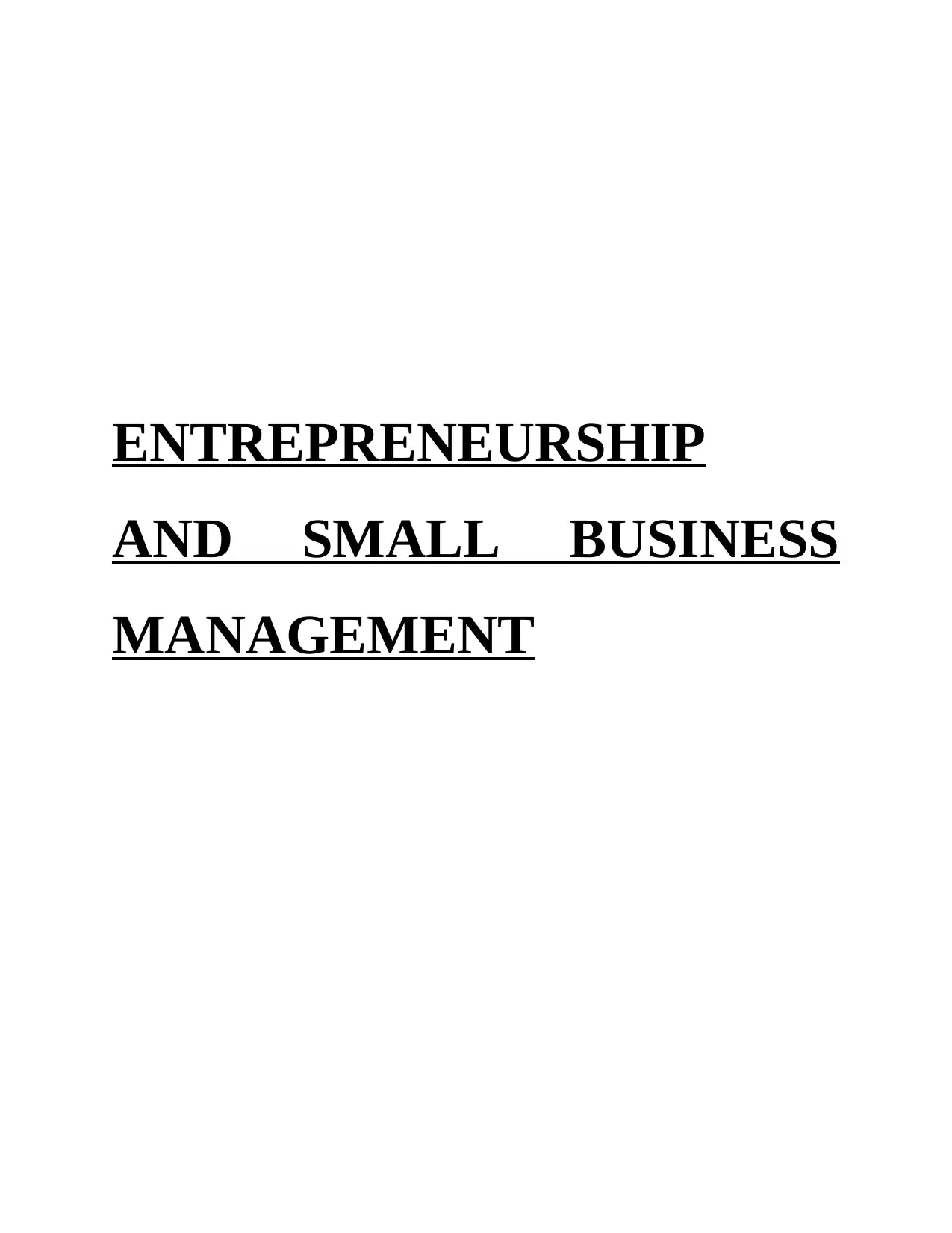
ENTREPRENEURSHIP
AND SMALL BUSINESS
MANAGEMENT
AND SMALL BUSINESS
MANAGEMENT
Paraphrase This Document
Need a fresh take? Get an instant paraphrase of this document with our AI Paraphraser
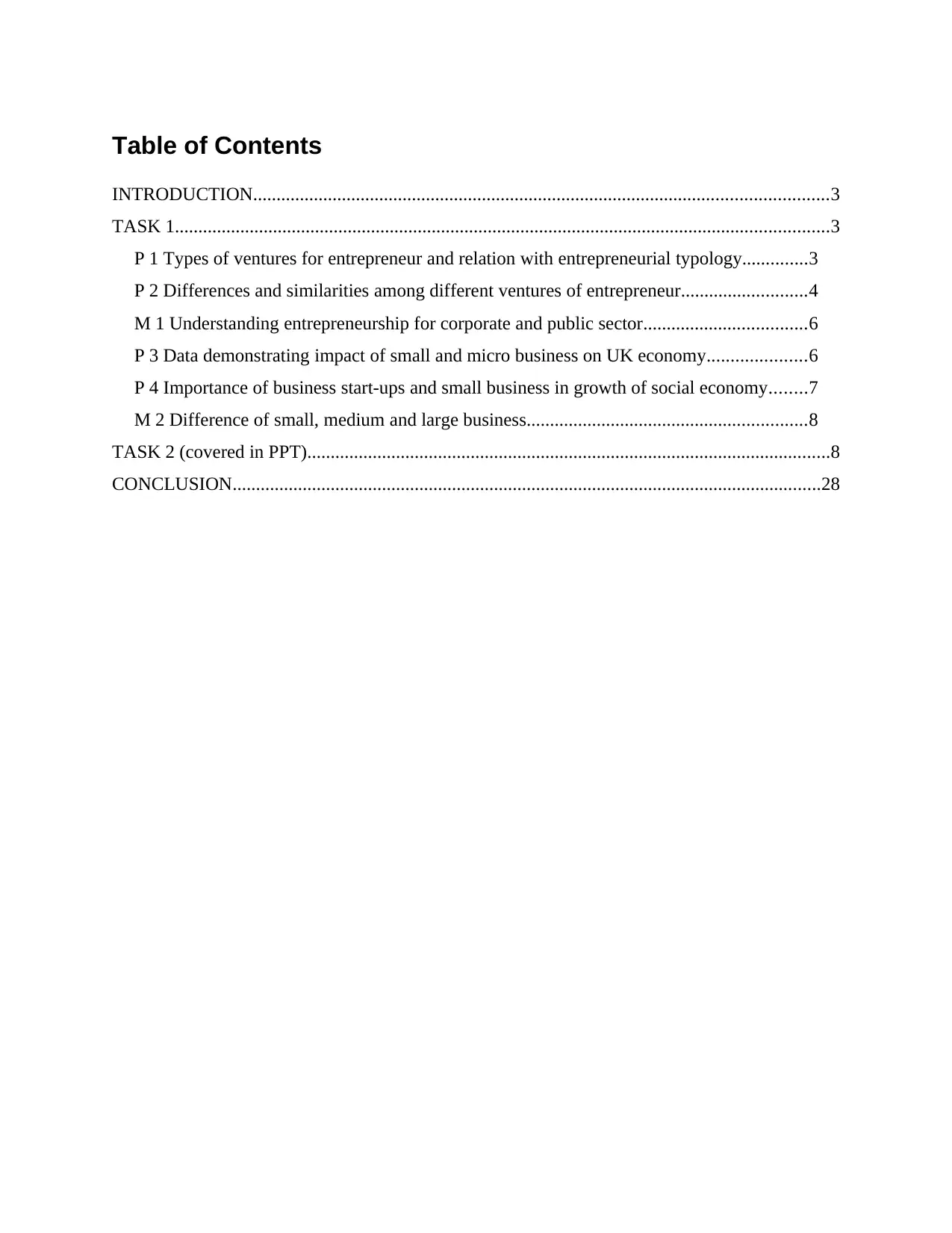
Table of Contents
INTRODUCTION...........................................................................................................................3
TASK 1............................................................................................................................................3
P 1 Types of ventures for entrepreneur and relation with entrepreneurial typology..............3
P 2 Differences and similarities among different ventures of entrepreneur...........................4
M 1 Understanding entrepreneurship for corporate and public sector...................................6
P 3 Data demonstrating impact of small and micro business on UK economy.....................6
P 4 Importance of business start-ups and small business in growth of social economy........7
M 2 Difference of small, medium and large business............................................................8
TASK 2 (covered in PPT)................................................................................................................8
CONCLUSION..............................................................................................................................28
INTRODUCTION...........................................................................................................................3
TASK 1............................................................................................................................................3
P 1 Types of ventures for entrepreneur and relation with entrepreneurial typology..............3
P 2 Differences and similarities among different ventures of entrepreneur...........................4
M 1 Understanding entrepreneurship for corporate and public sector...................................6
P 3 Data demonstrating impact of small and micro business on UK economy.....................6
P 4 Importance of business start-ups and small business in growth of social economy........7
M 2 Difference of small, medium and large business............................................................8
TASK 2 (covered in PPT)................................................................................................................8
CONCLUSION..............................................................................................................................28
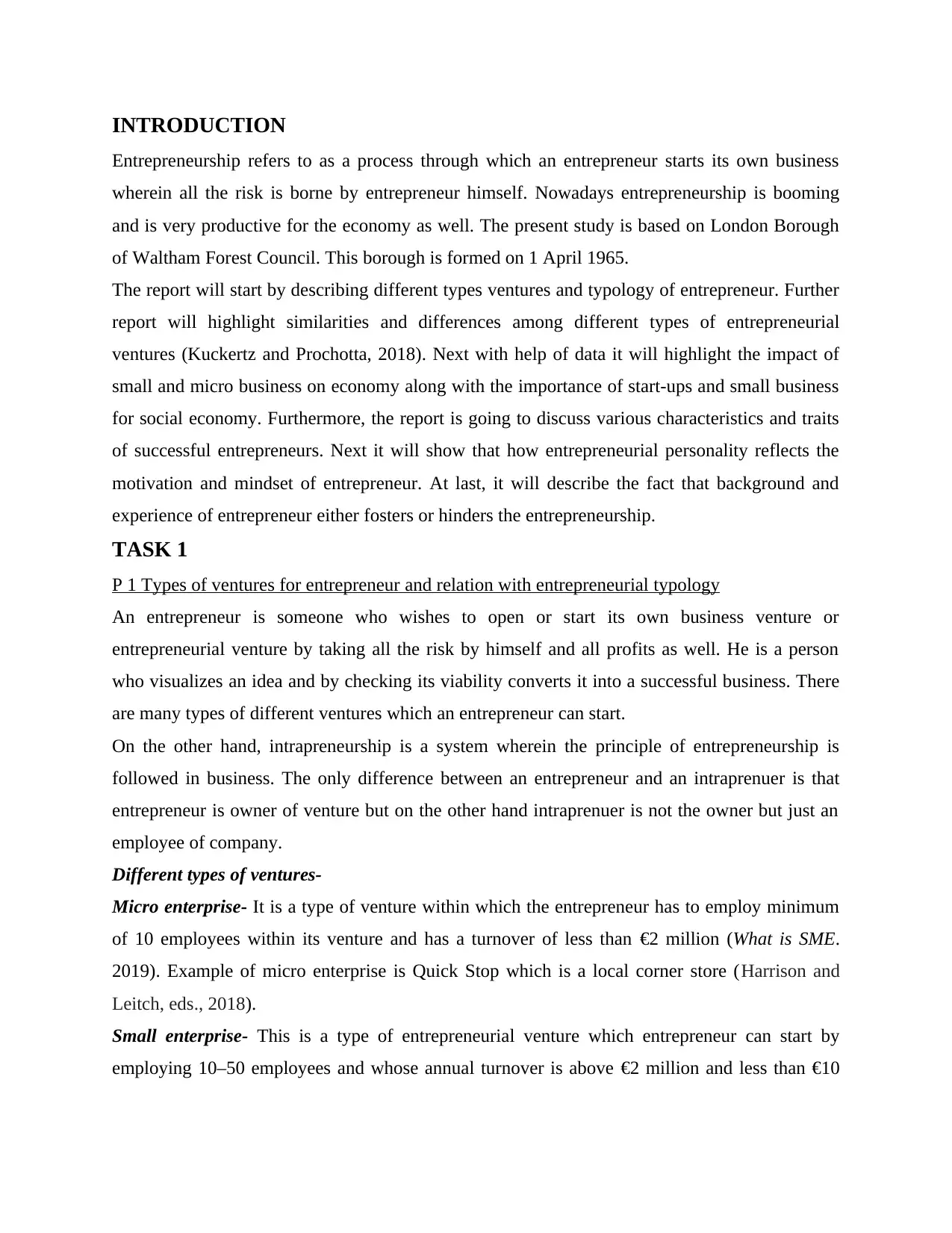
INTRODUCTION
Entrepreneurship refers to as a process through which an entrepreneur starts its own business
wherein all the risk is borne by entrepreneur himself. Nowadays entrepreneurship is booming
and is very productive for the economy as well. The present study is based on London Borough
of Waltham Forest Council. This borough is formed on 1 April 1965.
The report will start by describing different types ventures and typology of entrepreneur. Further
report will highlight similarities and differences among different types of entrepreneurial
ventures (Kuckertz and Prochotta, 2018). Next with help of data it will highlight the impact of
small and micro business on economy along with the importance of start-ups and small business
for social economy. Furthermore, the report is going to discuss various characteristics and traits
of successful entrepreneurs. Next it will show that how entrepreneurial personality reflects the
motivation and mindset of entrepreneur. At last, it will describe the fact that background and
experience of entrepreneur either fosters or hinders the entrepreneurship.
TASK 1
P 1 Types of ventures for entrepreneur and relation with entrepreneurial typology
An entrepreneur is someone who wishes to open or start its own business venture or
entrepreneurial venture by taking all the risk by himself and all profits as well. He is a person
who visualizes an idea and by checking its viability converts it into a successful business. There
are many types of different ventures which an entrepreneur can start.
On the other hand, intrapreneurship is a system wherein the principle of entrepreneurship is
followed in business. The only difference between an entrepreneur and an intraprenuer is that
entrepreneur is owner of venture but on the other hand intraprenuer is not the owner but just an
employee of company.
Different types of ventures-
Micro enterprise- It is a type of venture within which the entrepreneur has to employ minimum
of 10 employees within its venture and has a turnover of less than €2 million (What is SME.
2019). Example of micro enterprise is Quick Stop which is a local corner store (Harrison and
Leitch, eds., 2018).
Small enterprise- This is a type of entrepreneurial venture which entrepreneur can start by
employing 10–50 employees and whose annual turnover is above €2 million and less than €10
Entrepreneurship refers to as a process through which an entrepreneur starts its own business
wherein all the risk is borne by entrepreneur himself. Nowadays entrepreneurship is booming
and is very productive for the economy as well. The present study is based on London Borough
of Waltham Forest Council. This borough is formed on 1 April 1965.
The report will start by describing different types ventures and typology of entrepreneur. Further
report will highlight similarities and differences among different types of entrepreneurial
ventures (Kuckertz and Prochotta, 2018). Next with help of data it will highlight the impact of
small and micro business on economy along with the importance of start-ups and small business
for social economy. Furthermore, the report is going to discuss various characteristics and traits
of successful entrepreneurs. Next it will show that how entrepreneurial personality reflects the
motivation and mindset of entrepreneur. At last, it will describe the fact that background and
experience of entrepreneur either fosters or hinders the entrepreneurship.
TASK 1
P 1 Types of ventures for entrepreneur and relation with entrepreneurial typology
An entrepreneur is someone who wishes to open or start its own business venture or
entrepreneurial venture by taking all the risk by himself and all profits as well. He is a person
who visualizes an idea and by checking its viability converts it into a successful business. There
are many types of different ventures which an entrepreneur can start.
On the other hand, intrapreneurship is a system wherein the principle of entrepreneurship is
followed in business. The only difference between an entrepreneur and an intraprenuer is that
entrepreneur is owner of venture but on the other hand intraprenuer is not the owner but just an
employee of company.
Different types of ventures-
Micro enterprise- It is a type of venture within which the entrepreneur has to employ minimum
of 10 employees within its venture and has a turnover of less than €2 million (What is SME.
2019). Example of micro enterprise is Quick Stop which is a local corner store (Harrison and
Leitch, eds., 2018).
Small enterprise- This is a type of entrepreneurial venture which entrepreneur can start by
employing 10–50 employees and whose annual turnover is above €2 million and less than €10
⊘ This is a preview!⊘
Do you want full access?
Subscribe today to unlock all pages.

Trusted by 1+ million students worldwide
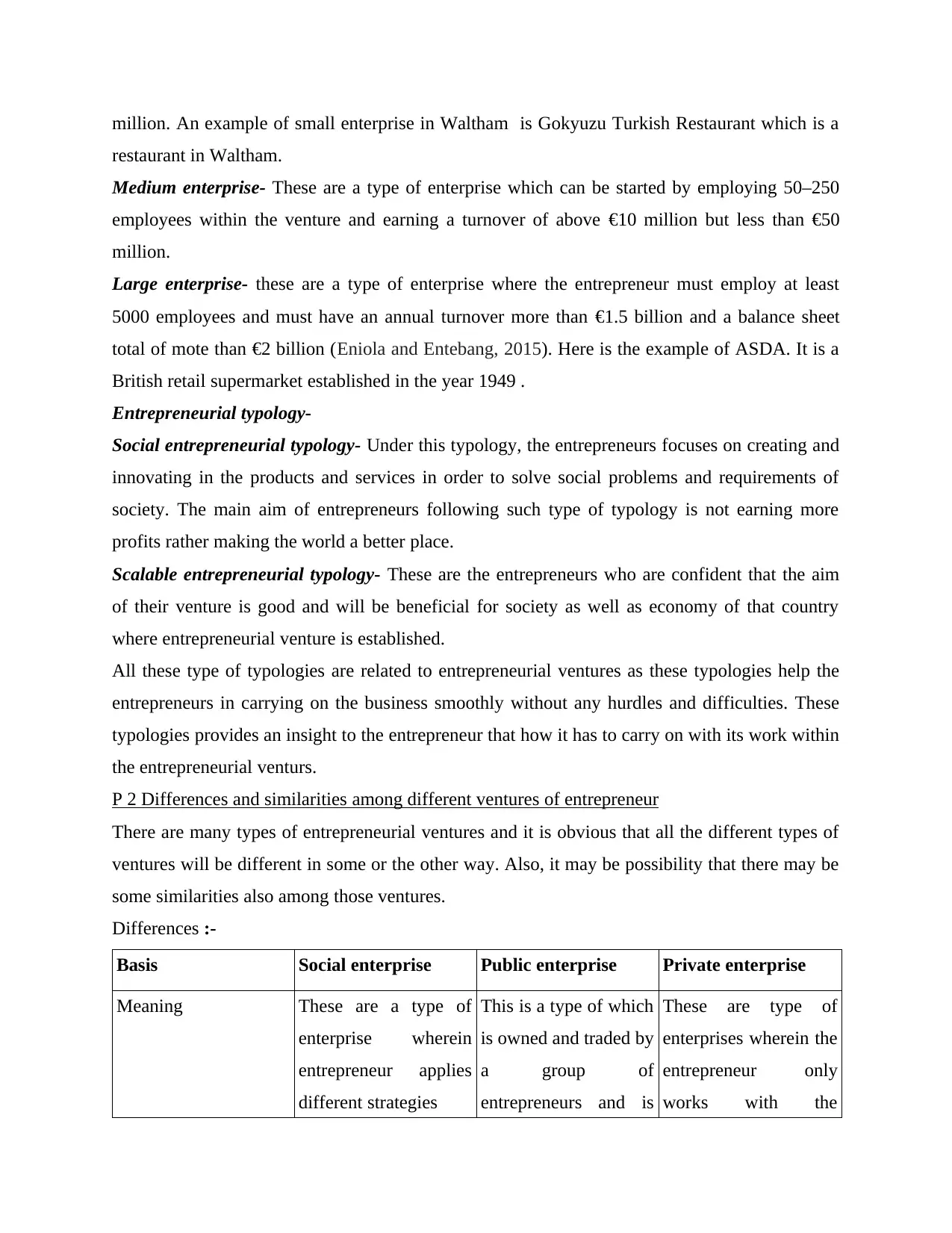
million. An example of small enterprise in Waltham is Gokyuzu Turkish Restaurant which is a
restaurant in Waltham.
Medium enterprise- These are a type of enterprise which can be started by employing 50–250
employees within the venture and earning a turnover of above €10 million but less than €50
million.
Large enterprise- these are a type of enterprise where the entrepreneur must employ at least
5000 employees and must have an annual turnover more than €1.5 billion and a balance sheet
total of mote than €2 billion (Eniola and Entebang, 2015). Here is the example of ASDA. It is a
British retail supermarket established in the year 1949 .
Entrepreneurial typology-
Social entrepreneurial typology- Under this typology, the entrepreneurs focuses on creating and
innovating in the products and services in order to solve social problems and requirements of
society. The main aim of entrepreneurs following such type of typology is not earning more
profits rather making the world a better place.
Scalable entrepreneurial typology- These are the entrepreneurs who are confident that the aim
of their venture is good and will be beneficial for society as well as economy of that country
where entrepreneurial venture is established.
All these type of typologies are related to entrepreneurial ventures as these typologies help the
entrepreneurs in carrying on the business smoothly without any hurdles and difficulties. These
typologies provides an insight to the entrepreneur that how it has to carry on with its work within
the entrepreneurial venturs.
P 2 Differences and similarities among different ventures of entrepreneur
There are many types of entrepreneurial ventures and it is obvious that all the different types of
ventures will be different in some or the other way. Also, it may be possibility that there may be
some similarities also among those ventures.
Differences :-
Basis Social enterprise Public enterprise Private enterprise
Meaning These are a type of
enterprise wherein
entrepreneur applies
different strategies
This is a type of which
is owned and traded by
a group of
entrepreneurs and is
These are type of
enterprises wherein the
entrepreneur only
works with the
restaurant in Waltham.
Medium enterprise- These are a type of enterprise which can be started by employing 50–250
employees within the venture and earning a turnover of above €10 million but less than €50
million.
Large enterprise- these are a type of enterprise where the entrepreneur must employ at least
5000 employees and must have an annual turnover more than €1.5 billion and a balance sheet
total of mote than €2 billion (Eniola and Entebang, 2015). Here is the example of ASDA. It is a
British retail supermarket established in the year 1949 .
Entrepreneurial typology-
Social entrepreneurial typology- Under this typology, the entrepreneurs focuses on creating and
innovating in the products and services in order to solve social problems and requirements of
society. The main aim of entrepreneurs following such type of typology is not earning more
profits rather making the world a better place.
Scalable entrepreneurial typology- These are the entrepreneurs who are confident that the aim
of their venture is good and will be beneficial for society as well as economy of that country
where entrepreneurial venture is established.
All these type of typologies are related to entrepreneurial ventures as these typologies help the
entrepreneurs in carrying on the business smoothly without any hurdles and difficulties. These
typologies provides an insight to the entrepreneur that how it has to carry on with its work within
the entrepreneurial venturs.
P 2 Differences and similarities among different ventures of entrepreneur
There are many types of entrepreneurial ventures and it is obvious that all the different types of
ventures will be different in some or the other way. Also, it may be possibility that there may be
some similarities also among those ventures.
Differences :-
Basis Social enterprise Public enterprise Private enterprise
Meaning These are a type of
enterprise wherein
entrepreneur applies
different strategies
This is a type of which
is owned and traded by
a group of
entrepreneurs and is
These are type of
enterprises wherein the
entrepreneur only
works with the
Paraphrase This Document
Need a fresh take? Get an instant paraphrase of this document with our AI Paraphraser
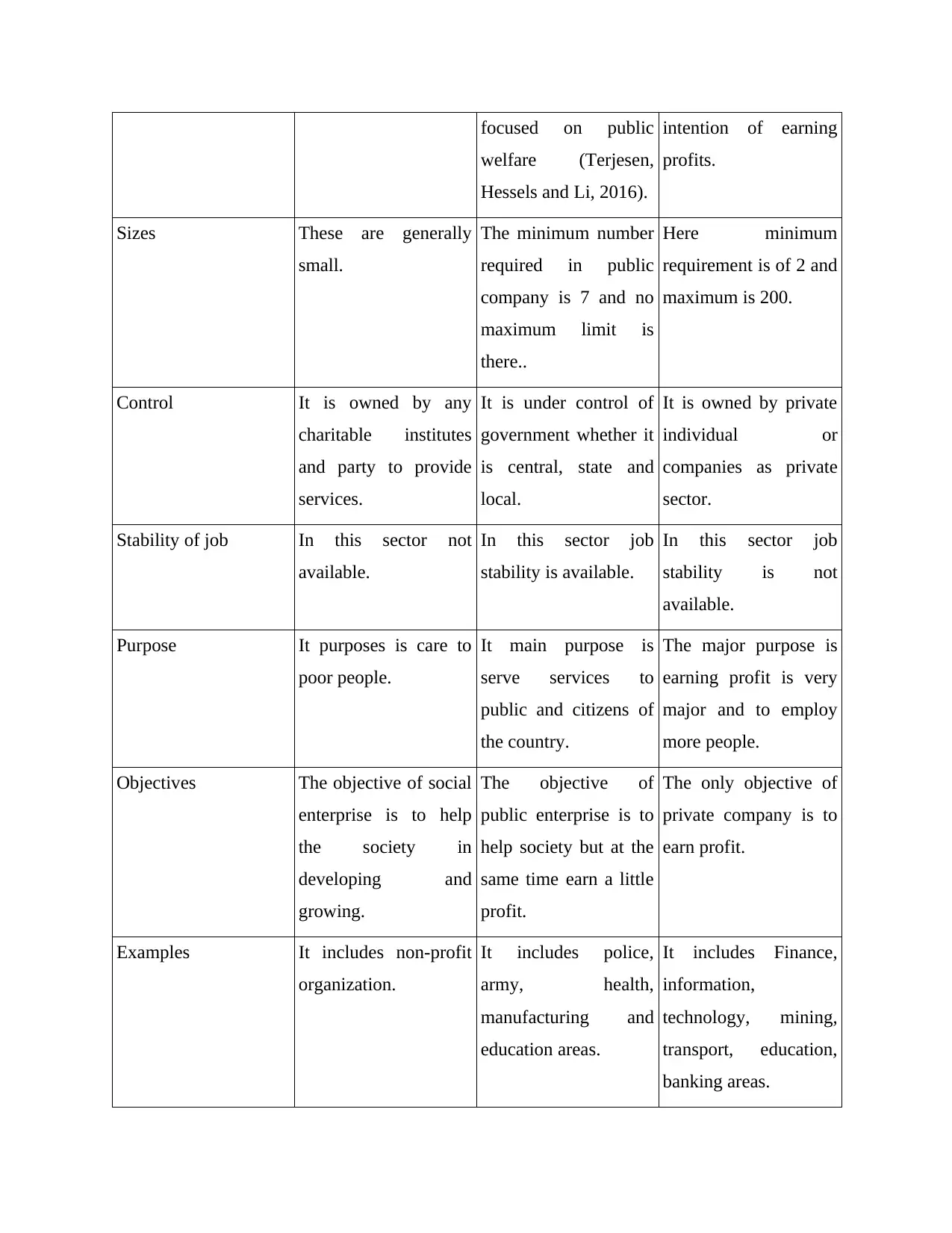
focused on public
welfare (Terjesen,
Hessels and Li, 2016).
intention of earning
profits.
Sizes These are generally
small.
The minimum number
required in public
company is 7 and no
maximum limit is
there..
Here minimum
requirement is of 2 and
maximum is 200.
Control It is owned by any
charitable institutes
and party to provide
services.
It is under control of
government whether it
is central, state and
local.
It is owned by private
individual or
companies as private
sector.
Stability of job In this sector not
available.
In this sector job
stability is available.
In this sector job
stability is not
available.
Purpose It purposes is care to
poor people.
It main purpose is
serve services to
public and citizens of
the country.
The major purpose is
earning profit is very
major and to employ
more people.
Objectives The objective of social
enterprise is to help
the society in
developing and
growing.
The objective of
public enterprise is to
help society but at the
same time earn a little
profit.
The only objective of
private company is to
earn profit.
Examples It includes non-profit
organization.
It includes police,
army, health,
manufacturing and
education areas.
It includes Finance,
information,
technology, mining,
transport, education,
banking areas.
welfare (Terjesen,
Hessels and Li, 2016).
intention of earning
profits.
Sizes These are generally
small.
The minimum number
required in public
company is 7 and no
maximum limit is
there..
Here minimum
requirement is of 2 and
maximum is 200.
Control It is owned by any
charitable institutes
and party to provide
services.
It is under control of
government whether it
is central, state and
local.
It is owned by private
individual or
companies as private
sector.
Stability of job In this sector not
available.
In this sector job
stability is available.
In this sector job
stability is not
available.
Purpose It purposes is care to
poor people.
It main purpose is
serve services to
public and citizens of
the country.
The major purpose is
earning profit is very
major and to employ
more people.
Objectives The objective of social
enterprise is to help
the society in
developing and
growing.
The objective of
public enterprise is to
help society but at the
same time earn a little
profit.
The only objective of
private company is to
earn profit.
Examples It includes non-profit
organization.
It includes police,
army, health,
manufacturing and
education areas.
It includes Finance,
information,
technology, mining,
transport, education,
banking areas.
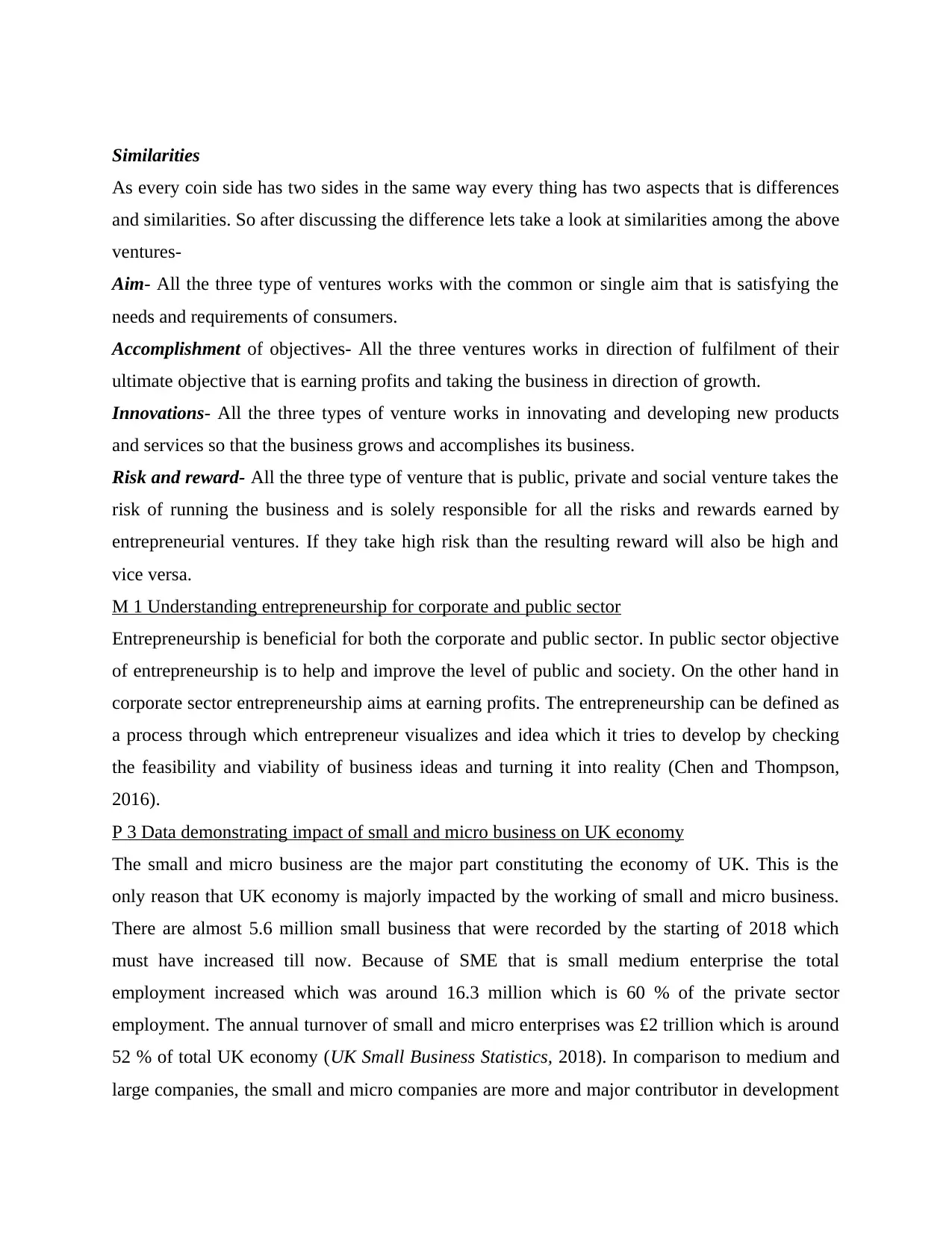
Similarities
As every coin side has two sides in the same way every thing has two aspects that is differences
and similarities. So after discussing the difference lets take a look at similarities among the above
ventures-
Aim- All the three type of ventures works with the common or single aim that is satisfying the
needs and requirements of consumers.
Accomplishment of objectives- All the three ventures works in direction of fulfilment of their
ultimate objective that is earning profits and taking the business in direction of growth.
Innovations- All the three types of venture works in innovating and developing new products
and services so that the business grows and accomplishes its business.
Risk and reward- All the three type of venture that is public, private and social venture takes the
risk of running the business and is solely responsible for all the risks and rewards earned by
entrepreneurial ventures. If they take high risk than the resulting reward will also be high and
vice versa.
M 1 Understanding entrepreneurship for corporate and public sector
Entrepreneurship is beneficial for both the corporate and public sector. In public sector objective
of entrepreneurship is to help and improve the level of public and society. On the other hand in
corporate sector entrepreneurship aims at earning profits. The entrepreneurship can be defined as
a process through which entrepreneur visualizes and idea which it tries to develop by checking
the feasibility and viability of business ideas and turning it into reality (Chen and Thompson,
2016).
P 3 Data demonstrating impact of small and micro business on UK economy
The small and micro business are the major part constituting the economy of UK. This is the
only reason that UK economy is majorly impacted by the working of small and micro business.
There are almost 5.6 million small business that were recorded by the starting of 2018 which
must have increased till now. Because of SME that is small medium enterprise the total
employment increased which was around 16.3 million which is 60 % of the private sector
employment. The annual turnover of small and micro enterprises was £2 trillion which is around
52 % of total UK economy (UK Small Business Statistics, 2018). In comparison to medium and
large companies, the small and micro companies are more and major contributor in development
As every coin side has two sides in the same way every thing has two aspects that is differences
and similarities. So after discussing the difference lets take a look at similarities among the above
ventures-
Aim- All the three type of ventures works with the common or single aim that is satisfying the
needs and requirements of consumers.
Accomplishment of objectives- All the three ventures works in direction of fulfilment of their
ultimate objective that is earning profits and taking the business in direction of growth.
Innovations- All the three types of venture works in innovating and developing new products
and services so that the business grows and accomplishes its business.
Risk and reward- All the three type of venture that is public, private and social venture takes the
risk of running the business and is solely responsible for all the risks and rewards earned by
entrepreneurial ventures. If they take high risk than the resulting reward will also be high and
vice versa.
M 1 Understanding entrepreneurship for corporate and public sector
Entrepreneurship is beneficial for both the corporate and public sector. In public sector objective
of entrepreneurship is to help and improve the level of public and society. On the other hand in
corporate sector entrepreneurship aims at earning profits. The entrepreneurship can be defined as
a process through which entrepreneur visualizes and idea which it tries to develop by checking
the feasibility and viability of business ideas and turning it into reality (Chen and Thompson,
2016).
P 3 Data demonstrating impact of small and micro business on UK economy
The small and micro business are the major part constituting the economy of UK. This is the
only reason that UK economy is majorly impacted by the working of small and micro business.
There are almost 5.6 million small business that were recorded by the starting of 2018 which
must have increased till now. Because of SME that is small medium enterprise the total
employment increased which was around 16.3 million which is 60 % of the private sector
employment. The annual turnover of small and micro enterprises was £2 trillion which is around
52 % of total UK economy (UK Small Business Statistics, 2018). In comparison to medium and
large companies, the small and micro companies are more and major contributor in development
⊘ This is a preview!⊘
Do you want full access?
Subscribe today to unlock all pages.

Trusted by 1+ million students worldwide
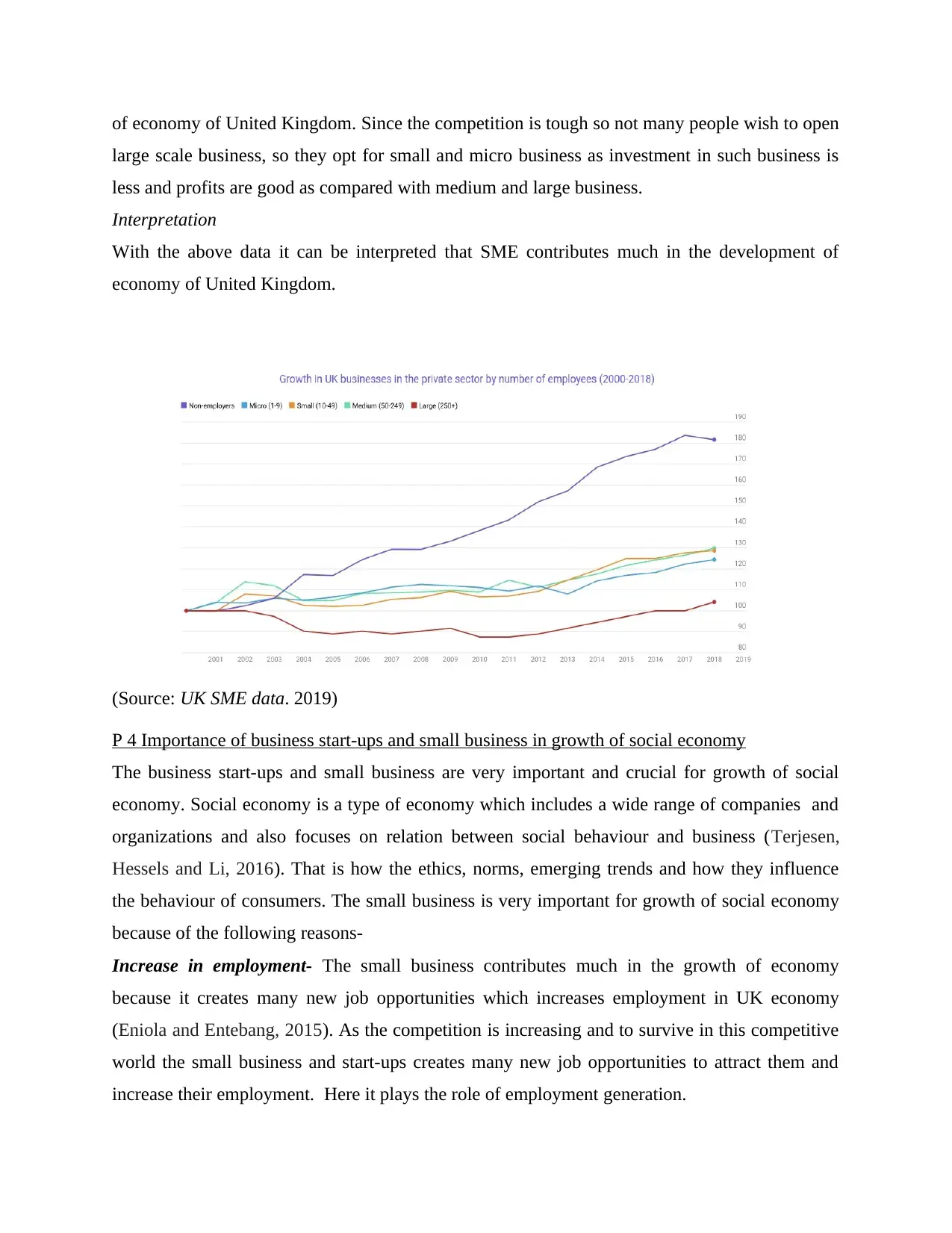
of economy of United Kingdom. Since the competition is tough so not many people wish to open
large scale business, so they opt for small and micro business as investment in such business is
less and profits are good as compared with medium and large business.
Interpretation
With the above data it can be interpreted that SME contributes much in the development of
economy of United Kingdom.
(Source: UK SME data. 2019)
P 4 Importance of business start-ups and small business in growth of social economy
The business start-ups and small business are very important and crucial for growth of social
economy. Social economy is a type of economy which includes a wide range of companies and
organizations and also focuses on relation between social behaviour and business (Terjesen,
Hessels and Li, 2016). That is how the ethics, norms, emerging trends and how they influence
the behaviour of consumers. The small business is very important for growth of social economy
because of the following reasons-
Increase in employment- The small business contributes much in the growth of economy
because it creates many new job opportunities which increases employment in UK economy
(Eniola and Entebang, 2015). As the competition is increasing and to survive in this competitive
world the small business and start-ups creates many new job opportunities to attract them and
increase their employment. Here it plays the role of employment generation.
large scale business, so they opt for small and micro business as investment in such business is
less and profits are good as compared with medium and large business.
Interpretation
With the above data it can be interpreted that SME contributes much in the development of
economy of United Kingdom.
(Source: UK SME data. 2019)
P 4 Importance of business start-ups and small business in growth of social economy
The business start-ups and small business are very important and crucial for growth of social
economy. Social economy is a type of economy which includes a wide range of companies and
organizations and also focuses on relation between social behaviour and business (Terjesen,
Hessels and Li, 2016). That is how the ethics, norms, emerging trends and how they influence
the behaviour of consumers. The small business is very important for growth of social economy
because of the following reasons-
Increase in employment- The small business contributes much in the growth of economy
because it creates many new job opportunities which increases employment in UK economy
(Eniola and Entebang, 2015). As the competition is increasing and to survive in this competitive
world the small business and start-ups creates many new job opportunities to attract them and
increase their employment. Here it plays the role of employment generation.
Paraphrase This Document
Need a fresh take? Get an instant paraphrase of this document with our AI Paraphraser
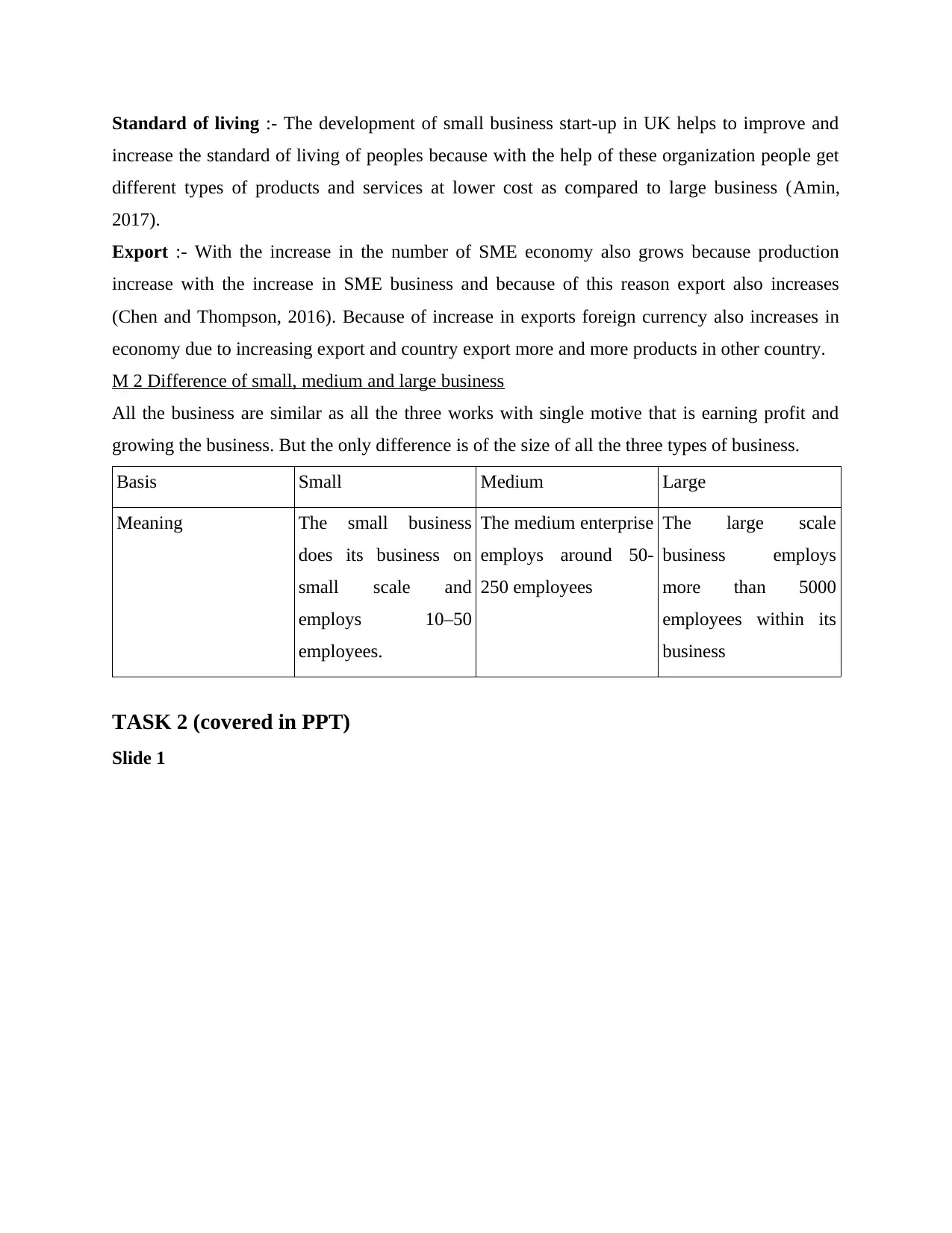
Standard of living :- The development of small business start-up in UK helps to improve and
increase the standard of living of peoples because with the help of these organization people get
different types of products and services at lower cost as compared to large business (Amin,
2017).
Export :- With the increase in the number of SME economy also grows because production
increase with the increase in SME business and because of this reason export also increases
(Chen and Thompson, 2016). Because of increase in exports foreign currency also increases in
economy due to increasing export and country export more and more products in other country.
M 2 Difference of small, medium and large business
All the business are similar as all the three works with single motive that is earning profit and
growing the business. But the only difference is of the size of all the three types of business.
Basis Small Medium Large
Meaning The small business
does its business on
small scale and
employs 10–50
employees.
The medium enterprise
employs around 50-
250 employees
The large scale
business employs
more than 5000
employees within its
business
TASK 2 (covered in PPT)
Slide 1
increase the standard of living of peoples because with the help of these organization people get
different types of products and services at lower cost as compared to large business (Amin,
2017).
Export :- With the increase in the number of SME economy also grows because production
increase with the increase in SME business and because of this reason export also increases
(Chen and Thompson, 2016). Because of increase in exports foreign currency also increases in
economy due to increasing export and country export more and more products in other country.
M 2 Difference of small, medium and large business
All the business are similar as all the three works with single motive that is earning profit and
growing the business. But the only difference is of the size of all the three types of business.
Basis Small Medium Large
Meaning The small business
does its business on
small scale and
employs 10–50
employees.
The medium enterprise
employs around 50-
250 employees
The large scale
business employs
more than 5000
employees within its
business
TASK 2 (covered in PPT)
Slide 1
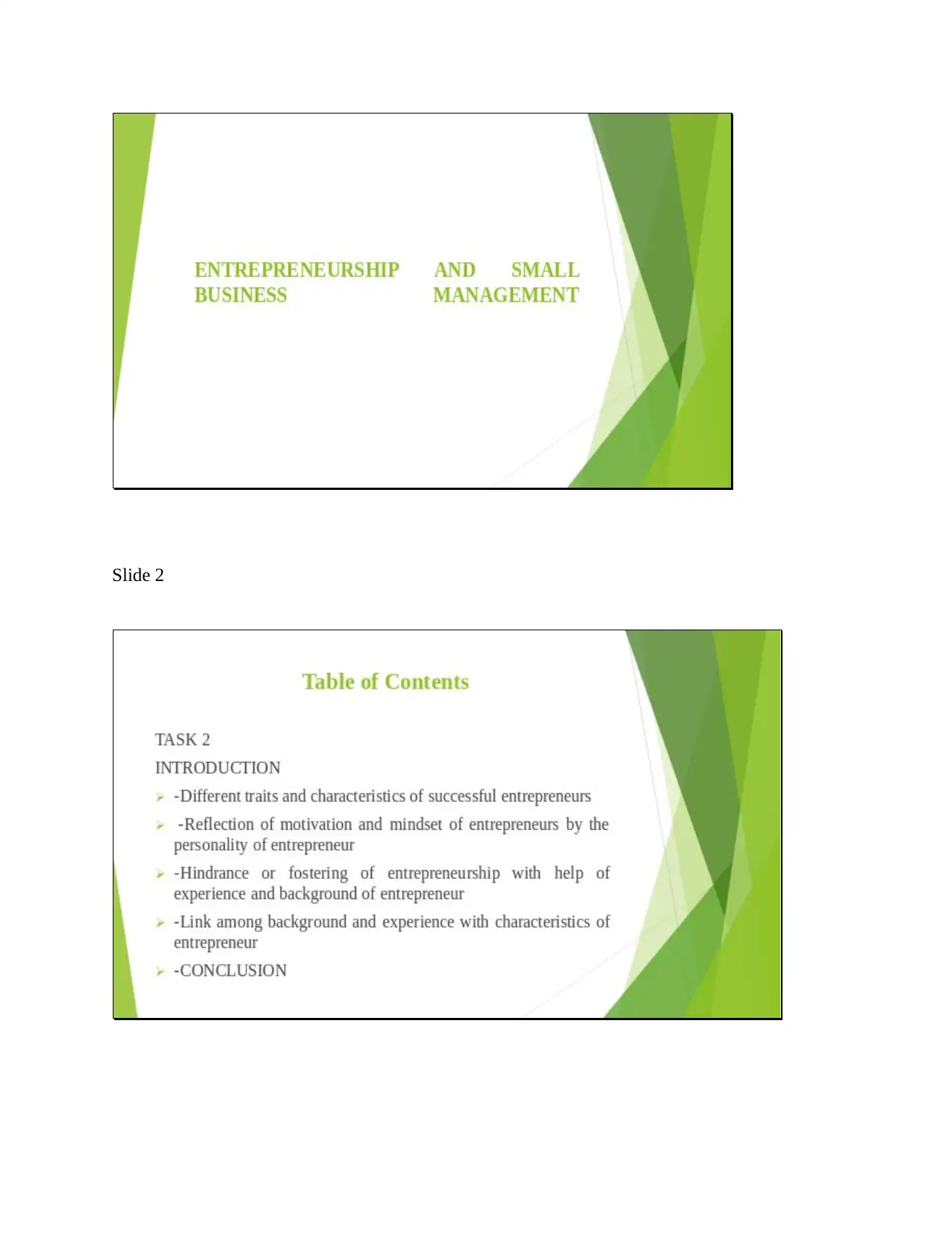
Slide 2
⊘ This is a preview!⊘
Do you want full access?
Subscribe today to unlock all pages.

Trusted by 1+ million students worldwide
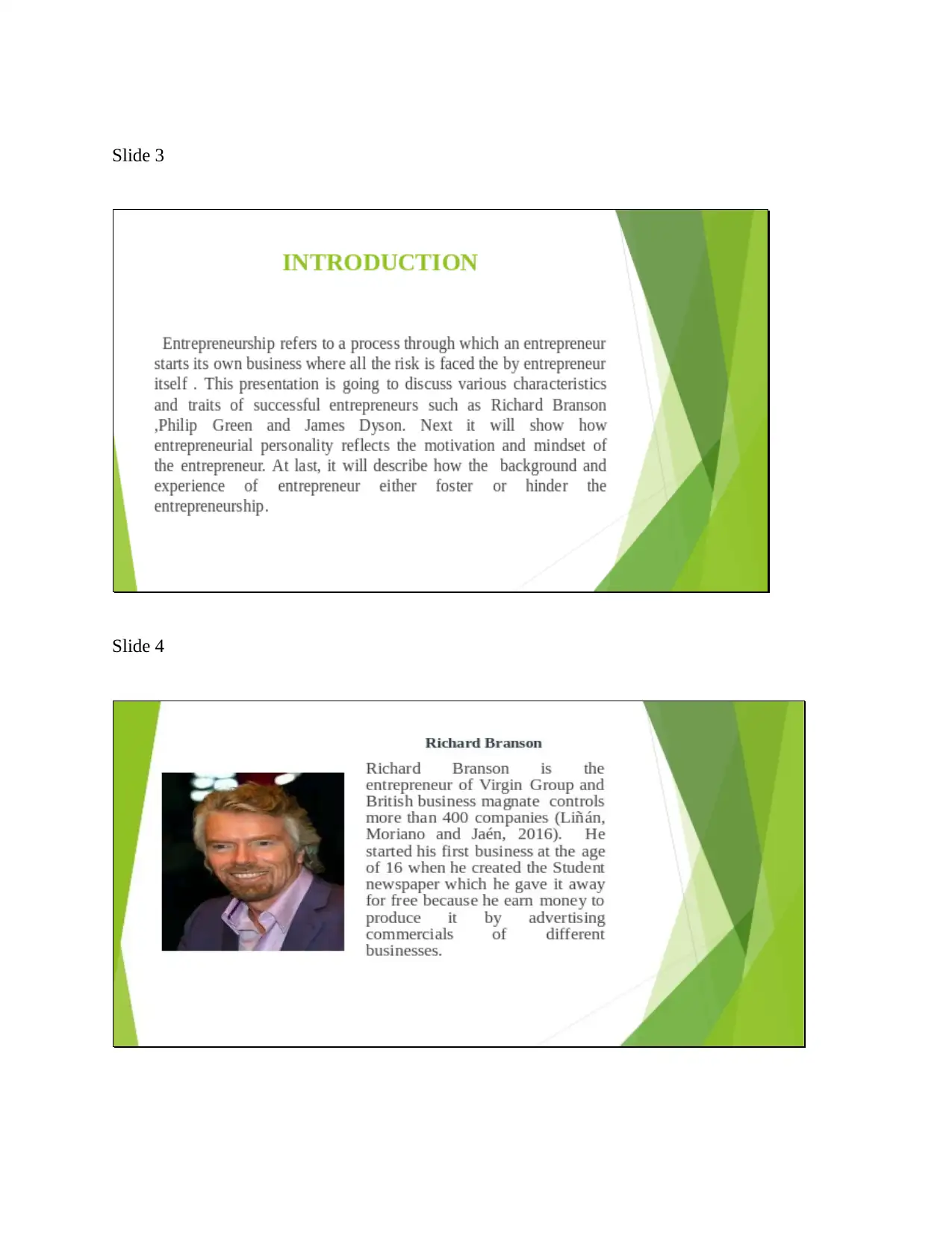
Slide 3
Slide 4
Slide 4
Paraphrase This Document
Need a fresh take? Get an instant paraphrase of this document with our AI Paraphraser
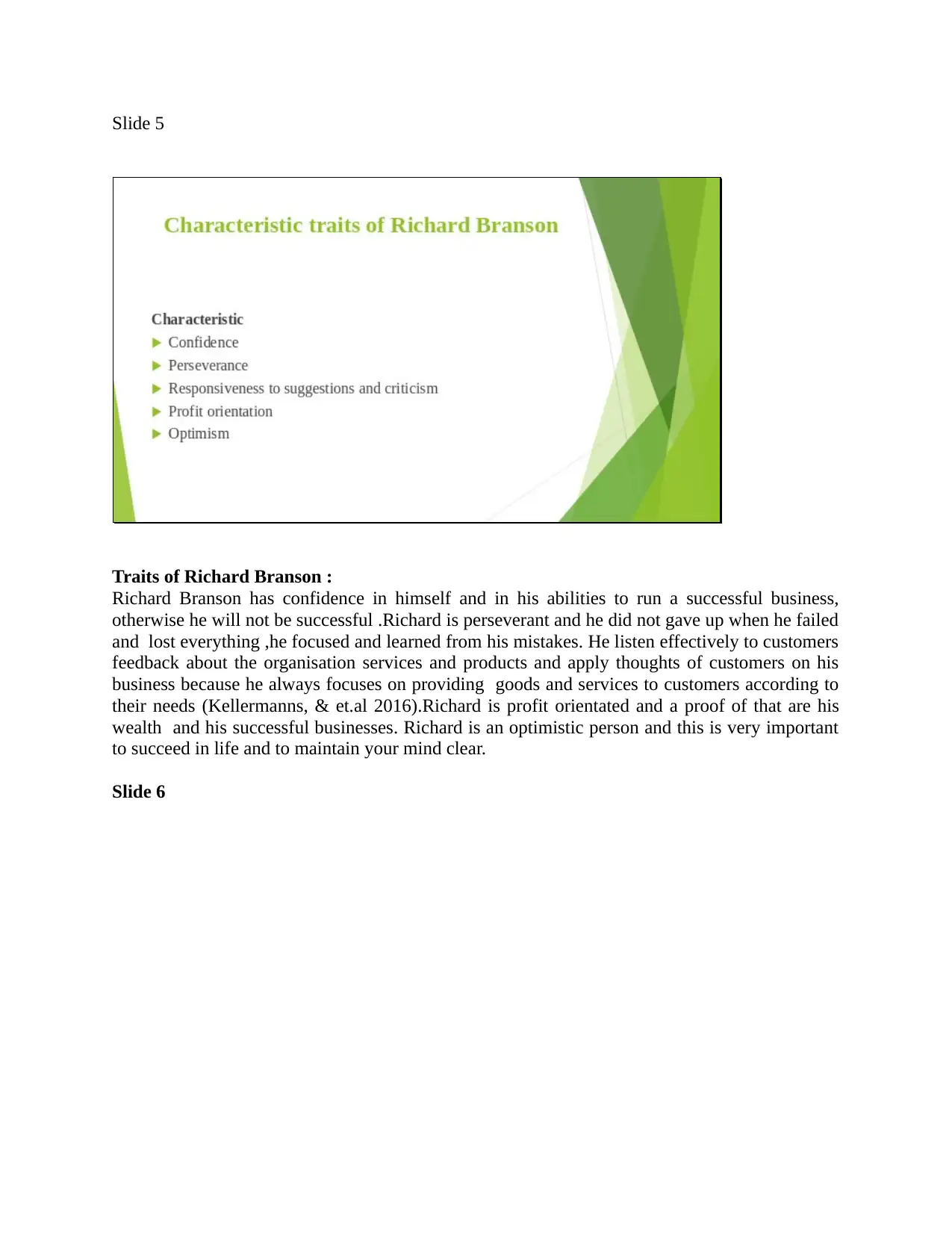
Slide 5
Traits of Richard Branson :
Richard Branson has confidence in himself and in his abilities to run a successful business,
otherwise he will not be successful .Richard is perseverant and he did not gave up when he failed
and lost everything ,he focused and learned from his mistakes. He listen effectively to customers
feedback about the organisation services and products and apply thoughts of customers on his
business because he always focuses on providing goods and services to customers according to
their needs (Kellermanns, & et.al 2016).Richard is profit orientated and a proof of that are his
wealth and his successful businesses. Richard is an optimistic person and this is very important
to succeed in life and to maintain your mind clear.
Slide 6
Traits of Richard Branson :
Richard Branson has confidence in himself and in his abilities to run a successful business,
otherwise he will not be successful .Richard is perseverant and he did not gave up when he failed
and lost everything ,he focused and learned from his mistakes. He listen effectively to customers
feedback about the organisation services and products and apply thoughts of customers on his
business because he always focuses on providing goods and services to customers according to
their needs (Kellermanns, & et.al 2016).Richard is profit orientated and a proof of that are his
wealth and his successful businesses. Richard is an optimistic person and this is very important
to succeed in life and to maintain your mind clear.
Slide 6
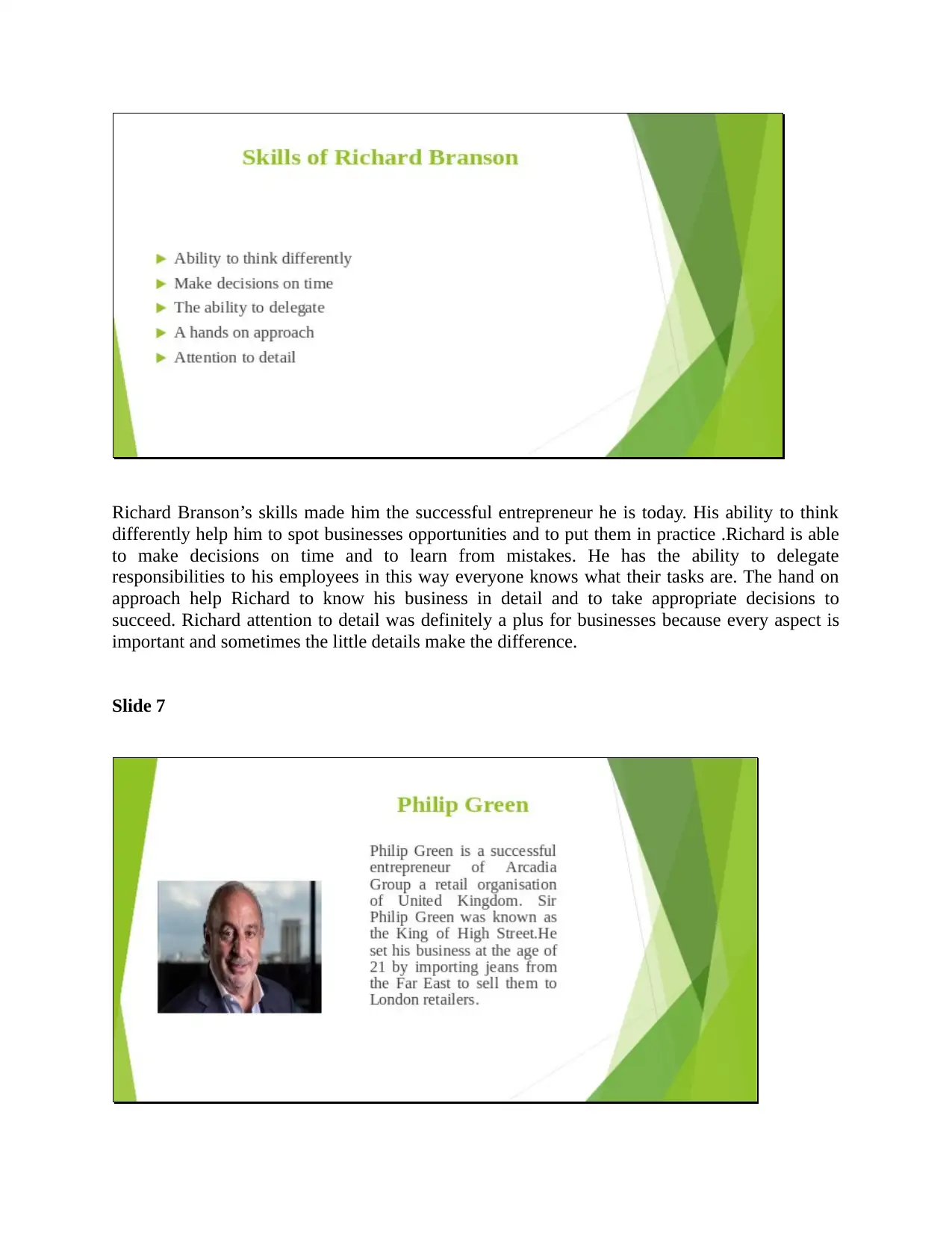
Richard Branson’s skills made him the successful entrepreneur he is today. His ability to think
differently help him to spot businesses opportunities and to put them in practice .Richard is able
to make decisions on time and to learn from mistakes. He has the ability to delegate
responsibilities to his employees in this way everyone knows what their tasks are. The hand on
approach help Richard to know his business in detail and to take appropriate decisions to
succeed. Richard attention to detail was definitely a plus for businesses because every aspect is
important and sometimes the little details make the difference.
Slide 7
differently help him to spot businesses opportunities and to put them in practice .Richard is able
to make decisions on time and to learn from mistakes. He has the ability to delegate
responsibilities to his employees in this way everyone knows what their tasks are. The hand on
approach help Richard to know his business in detail and to take appropriate decisions to
succeed. Richard attention to detail was definitely a plus for businesses because every aspect is
important and sometimes the little details make the difference.
Slide 7
⊘ This is a preview!⊘
Do you want full access?
Subscribe today to unlock all pages.

Trusted by 1+ million students worldwide
1 out of 29
Related Documents
Your All-in-One AI-Powered Toolkit for Academic Success.
+13062052269
info@desklib.com
Available 24*7 on WhatsApp / Email
![[object Object]](/_next/static/media/star-bottom.7253800d.svg)
Unlock your academic potential
Copyright © 2020–2026 A2Z Services. All Rights Reserved. Developed and managed by ZUCOL.





